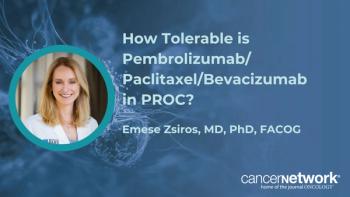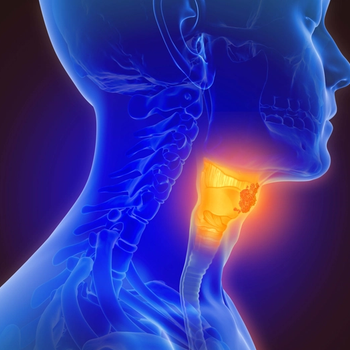
Genomic Analysis Yields ‘Hypothesis Generating’ Data in Bladder Cancer Subtype
An expert from Chase Comprehensive Cancer Center discusses how findings from a genomic analysis of the phase 2 BLASST-1 trial may identify biomarkers of response and resistance to nivolumab/chemotherapy in muscle-invasive bladder cancer.
During the
Data from a genomic correlative analysis of the phase 2 BLASST-1 trial (NCT03294304) identified mutations that were specific to responders and non-responders in addition to discovering several somatic hotspot mutations in a population of 10 patients.
Transcript:
We previously presented the clinical data [for this trial] at the 2020 Genitourinary Cancer Symposium. [At this year’s meeting], we presented the genomic data from the DNA sequencing [analysis] for our patients who enrolled on the BLASST-1 trial. We found that the median tumor mutational burden matched closely with [The Cancer Genome Atlas] TCGA results.
We also identified mutations in ERCC2, ARID1A, ERBB2, ERBB3, BRCA2, and VHL that were exclusively present in responders—those who had pathologic downstaging—vs ERCC4, PALB2, C3KN2A, and CSMD3 [which] were exclusively present in nonresponders.
This is hypothesis generating for how we can understand biomarkers of response and resistance. We also found some somatic hotspot mutations in 10 patients [including] FGFR3, PIKCA, KDM6A, TP53, and other genes.
Lastly, we looked at oncogenic signaling pathways and found those in 20 patients—for example, genomic integrity, RTK signaling, and transcription factor. The RTK signaling and transcription factor were primarily enriched in responders only.
These findings are providing insight into how we can tease out what immunotherapy is adding to chemotherapy. There have already been work done on biomarkers of response to cisplatin-based chemotherapy. We wanted to tease that out.
We’re also on a bigger level comparing the genomic analysis from this chemoimmunotherapy combination trial to patients who enrolled in the phase 2 PURE-01 trial [NCT02736266] who got pembrolizumab [Keytruda] alone, and patients who got chemotherapy alone in another neoadjuvant chemotherapy cohort as a part of our Department of Defense grant.
The idea is to understand how biomarkers play a role in response and resistance and can potentially help us select patients better.
Reference
Gupta S, Makarov V, Sonpavde GP, et al. Genomic analysis from BLASST-1 (Bladder Cancer Signal Seeking Trial) of nivolumab, gemcitabine, and cisplatin in patients with MIBC undergoing cystectomy. J Clin Oncol. 2023;41(suppl 6):559. doi:10.1200/JCO.2023.41.6_suppl.559
Newsletter
Stay up to date on recent advances in the multidisciplinary approach to cancer.










































